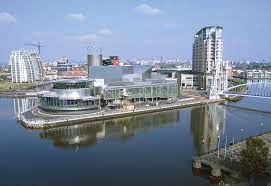Salford, a vibrant city in Greater Manchester, England, is a multifaceted urban hub that combines industrial heritage, cultural richness, and ongoing urban regeneration. Situated just west of Manchester city center, Salford has evolved from its industrial roots into a diverse and dynamic community with a mix of historic landmarks, modern developments, and a thriving arts scene.
**Industrial Legacy:**
Salford’s history is deeply intertwined with the Industrial Revolution, and remnants of its industrial past can still be seen today. The city played a significant role in textile production, cotton mills, and the transportation industry. Salford Quays, once a bustling dockland, is a testament to the city’s industrial legacy. Today, it has been revitalized into a cultural and residential hub, hosting iconic buildings such as The Lowry and MediaCityUK.
**MediaCityUK:**
One of Salford’s most notable contemporary developments is MediaCityUK, a waterfront district that has become a major media and creative hub. It houses the BBC’s northern headquarters, offering a vibrant mix of media, digital, and creative businesses. MediaCityUK has not only transformed the Salford Quays area but has also positioned Salford as a key player in the UK’s media landscape.
**Cultural Diversity:**
Salford is characterized by its diverse population, contributing to a rich cultural tapestry. The city is home to a mix of communities, reflecting a broad range of cultures and backgrounds. This diversity is evident in the variety of shops, restaurants, and cultural events that take place throughout the city, creating a welcoming atmosphere for residents and visitors alike.
**Historic Landmarks:**
Salford boasts several historic landmarks that showcase its architectural and cultural heritage. Ordsall Hall, a Tudor manor house, stands as one of Salford’s oldest buildings and offers a glimpse into the city’s past. The Salford Cathedral, dedicated to St. John the Evangelist, is another architectural gem that holds historical significance.
**Educational Institutions:**
Salford is home to the University of Salford, a prominent educational institution with a history dating back to 1896. The university plays a crucial role in shaping the city’s academic landscape, contributing to research, innovation, and the development of skilled professionals across various disciplines.
**Green Spaces and Parks:**
Despite its urban setting, Salford incorporates green spaces and parks that provide opportunities for recreation and relaxation. Buile Hill Park, with its expansive grounds and historic features, is a popular destination for residents seeking outdoor activities. The presence of green spaces contributes to the overall quality of life in the city.
**Regeneration Projects:**
Salford has undergone significant regeneration projects aimed at revitalizing key areas and improving infrastructure. The regeneration of Salford Quays and the ongoing development projects in other parts of the city showcase a commitment to enhancing the urban environment and creating modern, sustainable spaces.
**Transportation and Connectivity:**
Salford’s strategic location ensures excellent transportation links, with major roads, railways, and public transportation options connecting the city to neighboring areas. The proximity to Manchester city center further enhances accessibility, providing residents and visitors with convenient travel options.
**Cultural Venues and Events:**
Salford’s cultural scene is vibrant and diverse, with numerous venues hosting events throughout the year. The Lowry, a contemporary arts center at Salford Quays, showcases visual and performing arts, while The Peel Park Quarter provides a platform for live performances and cultural activities. The city’s commitment to cultural enrichment is evident in its calendar of events, festivals, and exhibitions.
**Community Engagement:**
Salford maintains a strong sense of community engagement, with local initiatives, community centers, and social projects fostering a spirit of collaboration. Residents actively participate in neighborhood events, and various community groups contribute to the overall sense of belonging in different parts of the city.
In conclusion, Salford is a city that encapsulates a harmonious blend of history, culture, and modernity. From its industrial heritage to contemporary developments, Salford has evolved into a dynamic urban landscape. The city’s commitment to regeneration, cultural enrichment, and community engagement reflects its resilience and adaptability, making Salford a compelling destination for both residents and those exploring the Greater Manchester area.






